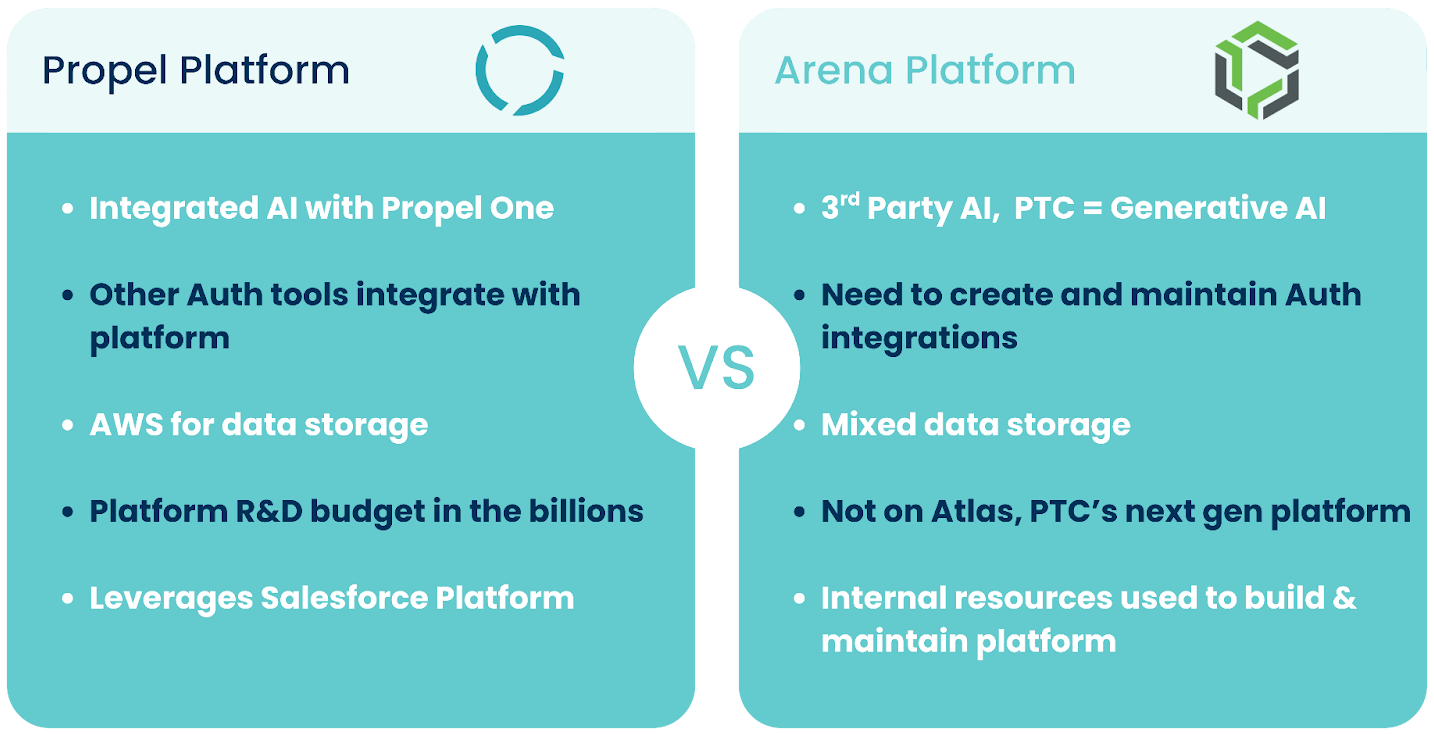Have you ever been in a position where your boss has asked you to evaluate the current solution your team uses versus new tech that’s out there?
It’s not about questioning whether you made the right decision at the time you selected your current software. Rather, with the changing costs and value of new features, you want to make sure you are still getting the best bang for your buck.
Let’s talk about a SaaS products platform, which under the hood makes your experience reliable, scalable, and secure. Having been a product manager for over a decade, I can tell you that the biggest challenge of developing SaaS software is deciding what to purchase versus develop.
There is always a tradeoff that has to be made when it comes to your resources, which is how I know Propel made the most advantageous choice for its platform—both for our users and their customers.
To illustrate, let’s compare the differences between Propel and Arena—two of the most prominent cloud-based SaaS providers of PLM and QMS solutions. Where Propel has chosen Salesforce as our platform, Arena continues to develop and support their own platform.

Comparison #1: AI
AI is top of mind in today’s drive for innovation.
AI’s integration into enterprise SaaS has surged because it unlocks unprecedented efficiency, predictive insights, and personalized user experiences. By automating routine workflows and surfacing real-time options, AI drives strategic decision-making and risk mitigation. As businesses face constant market disruption, AI-enabled platforms empower organizations to adapt swiftly, innovate continuously, and maintain a competitive advantage in a rapidly evolving digital economy.
To meet this need, Propel has already launched a powerful suite of role-based AI agents, Propel One, which leverages Salesforce’s native AI technology Agentforce. A foundational solution like Agentforce acts as a springboard for Propel’s development team, enabling us to focus on driving value with AI instead of building it from scratch or relying on third-party integrations.
With Propel One, customer-driven use cases can be automated, such as parsing assets to generate questions that can be chosen for training quizzes and summarizing quality issues on an item to inform a user of things to consider when evaluating design changes.
In contrast, Arena’s parent company, PTC, has focused AI development on generative design and other CAD-related automations. For example, Creo utilizes AI to generate mechanical part models optimizing for strength and weight. Thingworx has predictive analytics in manufacturing to predict machine failure. All good uses of AI, but they have nothing to do with PLM & QMS. Even in Arena’s recent AI announcement , AI is simply summarizing help desk articles. It’s not actually completing PLM or QMS tasks.
Comparison #2: Authentication
Over the years, I have worked for a range of companies, from large global organizations to products that are new to the market. One thing they are all consistently challenged with is having a comprehensive authentication solution.
Robust authentication underpins SaaS security, preventing unauthorized access and data breaches. By implementing multi-factor methods and adaptive, risk-based controls, organizations safeguard sensitive resources, bolster user trust, and meet regulatory mandates.
Even the largest global company has to pick and choose which authentication tools to integrate with and maintain. The reason for this is how resource-intensive and expensive it is to maintain multiple authentication tools.
Propel’s answer is the gold standard using Salesforce. Rather than having to develop integrations with authentication tools, those same tools have created integrations with Salesforce, meaning the resources and costs shift to those tools, and our customers get the best experience on an updated and accurate integration. This also frees up resources for Propel’s development team to create processes that solve customers' business challenges. In contrast, Arena uses their resources to create an SSO solution, where they maintain a variety of IdPs (listing Azure, Google, Jump Cloud, and Okta in their SSO Blog).
Comparison #3: Innovation
A product's platform can also unlock innovation. Propel’s customers benefit from an enterprise platform, with an annual R&D budget in the billions, backed by thousands of engineers.
With an innovative track record, trusted by over 150,000 customers worldwide, Propel users get integrations with the AppExchange, extending processes and access-controlled real-time reporting.
With Propel, your platform is:

When Arena and Onshape were acquired by PTC, part of the value was in their cloud software tech. Over the integration cycles, Onshape’s Atlas platform was chosen for the future of all their Saas products. Yet Arena has not been moved to this platform, and the only cloud PLM highlighted by PTC’s CEO in their recent investor presentations is Windchill+, which is built on Atlas.
The ramification of all the topics mentioned above comes down to one business decision. Propel leverages the Salesforce platform, so that we can spend our development cycles solving business challenges, whereas Arena chose to develop its own platform and is stuck solving infrastructure issues and product gaps instead of innovating.
If Atlas is indeed the platform of the future for PTC’s cloud products, Arena users should ask why they aren’t getting any of the benefits from that investment.
Conclusion
Choosing the right platform today is about securing your competitive edge for tomorrow. Propel’s Salesforce foundation and AI-powered solutions let you focus on innovation, not infrastructure — keeping you ahead while others play catch-up.
















